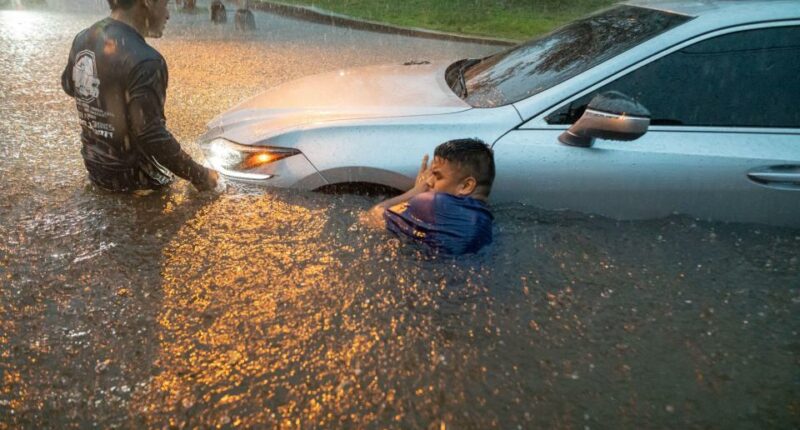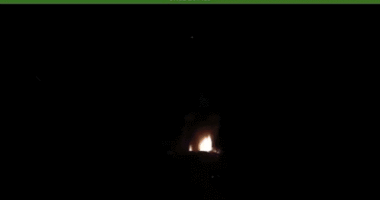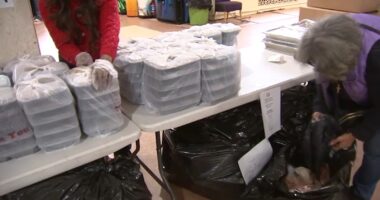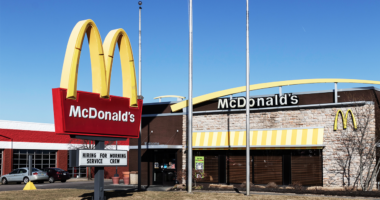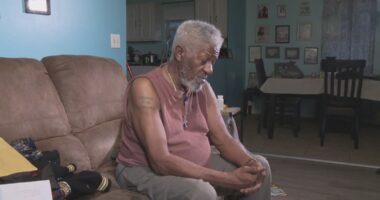Share this @internewscast.com
A massive deluge struck the tristate area on Monday night, resulting in flooded subway cars throughout New York City and prompting a state of emergency declaration in New Jersey.
Videos posted by commuters illustrated the heavy rainfall’s impact across the city, while New Jersey faced severe road flooding that led to closures.
Flights were also majorly delayed, leading to traveler disruptions on virtually every method of transportation in the area.
Some areas received up to seven inches of rain, as reported by the National Weather Service, along with thunderstorms accompanying the torrential downpour.
In New York City’s Central Park, 2.64 inches of rain was reported, breaking the previous July 14 record set in 1908 of 1.47 inches, the New York Times wrote.
Multiple train lines in the city were shuttered due to major flooding in many of its subway stations, too.
In Manhattan’s 28th St. station, one user video showed water pouring into the train car as water almost reached the turnstile in the station itself.
Reports said that NYC had the second wettest hour recorded – just bested by a night in 2021 following Hurricane Ida.
“Flooding can be deadly and often strikes with little or no warning. Streets, basements, and below-grade spaces can fill with water in minutes,” the city’s emergency management agency wrote on X.
“If you live in a basement apartment or low-lying area, be ready to move to higher ground. Keep your Go Bag near the door and clear exit paths.”
“Avoid flooded areas. Never walk or drive into water. Turn around, don’t drown.”
Pennsylvania and New Jersey were put under a flash flood warning until Tuesday morning, despite most rain tapering off during the night.
New Jersey was put into a state of emergency last night, however, as social media showed a stark scene of its roadways.
“Please stay indoors and avoid unnecessary travel. Stay safe, New Jersey,” Gov. Phil Murphy wrote on X.
In some videos and photos, water had risen up to vehicle lights as cars were attempting to drive on highways through the flooding.
Dozens of rescues happened in New Jersey, according to ABC7.
What to do during a flash flood
Many agencies offered flash flood advice during the storms. Here are ways to keep yourself safe.
- Don’t travel through floodwaters, including walking or driving
- Evacuate if emergency services say so
- Stay in your car if you get stuck as long as water doesn’t continue to rise.
- If water does continue to heighten, climb on top of your car
- If you’re in a building affected by flooding, go to the highest floor without shutting yourself in small areas like closets where you could become stuck
Source: Emergency Assistance Foundation
At least 30 houses were visited by emergency services in one town in the state, the outlet said.
The rain is now expected to move into the South, with flood watches in effect for Virginia, Maryland and Washington, D.C. into Tuesday night.
The intense flash flooding in the Northeast comes directly after Central Texas was hit with one of the worst storms it has had in recent memory, killing over 130 people.
Over 30 children were reported to have died in the July 4 flooding.
This week, the Lone Star state had even more rainfall, with 6 to 10 inches reportedly falling.
The new rain hindered rescue efforts as 101 people were still missing as of Monday night, over a week after the deadly waters rushed through Central Texas.
Many have pointed to climate change as the cause behind more intense flooding as powerful rain has hit areas across the entire country.
No deaths have been reported from the floods as of yet, and the Metropolitan Transportation Authority did not immediately respond for comment.
